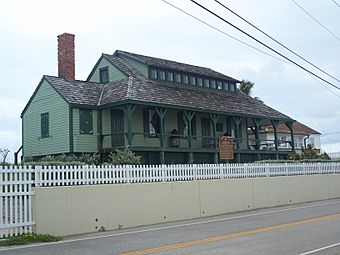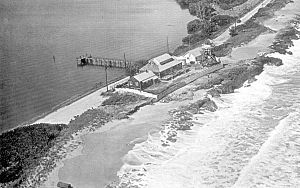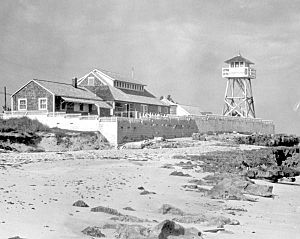House of Refuge at Gilbert's Bar facts for kids
Quick facts for kids |
|
|
House of Refuge at Gilbert's Bar
(Gilbert's Bar House of Refuge) |
|
 |
|
| Location | 301 S.E. MacArthur Boulevard near Stuart, Florida |
|---|---|
| Built | 1876 |
| NRHP reference No. | 74000651 |
| Added to NRHP | May 3, 1974 |
The House of Refuge at Gilbert's Bar is a very old and special building. It is found on Hutchinson Island, near Stuart, Florida. This building is the oldest one still standing in Martin County.
It was built in 1876 to help sailors who got into trouble at sea. It is the last of twelve "Houses of Refuge" that were once along Florida's Atlantic Coast. These houses were like safe havens for people whose ships wrecked. They were run by the United States Life-Saving Service, which later became part of the United States Coast Guard.
For almost 70 years, this house helped many people. Today, it is a museum. The Martin County Historical Society takes care of it. You can see old life-saving tools and what the keeper's home looked like around 1904. On May 3, 1974, the House of Refuge became a National Historic Place in the U.S..
Contents
A Safe Place for Sailors
The House of Refuge is located at a spot called Gilbert's Bar. This area is also known as "Saint Lucie Rocks." It has unique coastal rocks that stick out along the eastern coast of Florida. This house was one of ten "houses of refuge" built by the U.S. government. Their job was to offer shelter to sailors and travelers who were shipwrecked. These people often ended up on the lonely east coast of Florida. The House of Refuge at Gilbert's Bar is the only one of these original ten houses that is still here today.
In 1875, a piece of land at Saint Lucie Rocks was set aside for this important purpose. The houses of refuge were not like modern rescue stations with boats and crews. Instead, their main goal was to give food, water, and shelter to people who washed ashore. The keepers and their families would walk along the beach after storms. They would look for anyone who needed help. This was very important because the area was wild and empty back then.
Helping Shipwreck Survivors
The House of Refuge played a big part in helping people. In 1904, a ship called the Georges Valentine wrecked. Captain William E. Rea was the keeper of the house at that time. He helped seven survivors from that ship.
During the same storm, another Spanish ship, the Cosme Calzado, also wrecked nearby. Fifteen out of sixteen men from that ship survived. These men joined the Georges Valentine survivors at the House of Refuge. They stayed there until they could go home. One of the men, Edward Sarkenglov, even decided to stay in the area and became a local fisherman. Captain Rea and his wife lived and worked at the House of Refuge until May 1907.
Changes Over Time
In 1915, the U.S. Life-Saving Service joined with another group to form the modern U.S. Coast Guard. The House of Refuge then became U.S. Coast Guard Station #207. The keeper, Axel Johansen, stayed on. His job title changed from "Keeper" to "Surfman #1." Four other men were also stationed there. During World War I, local young people from the Home Guard helped out too.
The building was also used during World War II. It served as a lookout point for enemy submarines. In 1955, the Historical Society of Martin County saved the building from being lost. It is now a protected historic site.
Visiting the Museum
Today, the House of Refuge is a museum. It shows what life was like along the coast around the year 1900. When you visit, you can see different parts of the house. These include the boathouse, kitchen, dining room, and a bedroom. There is also a lookout tower that was built during World War II.
New exhibits at the museum show a timeline of Hutchinson Island. This timeline goes all the way back to 2000 BC. It also covers important events like the hurricanes of 2004.
See also
 | John T. Biggers |
 | Thomas Blackshear |
 | Mark Bradford |
 | Beverly Buchanan |





